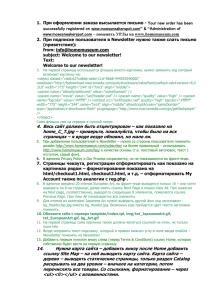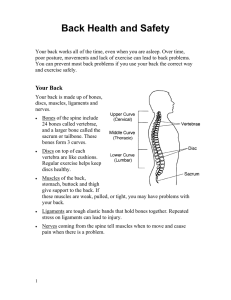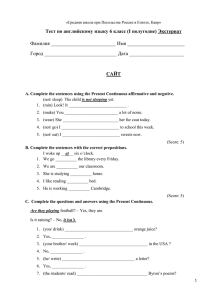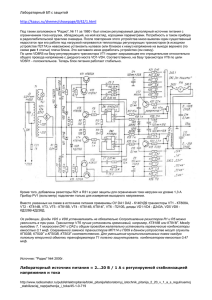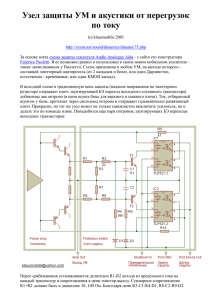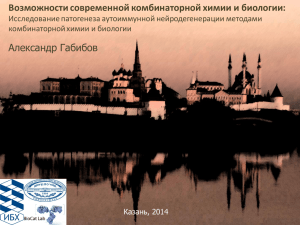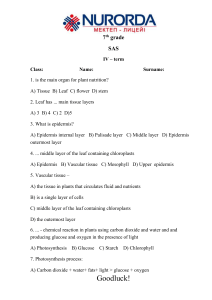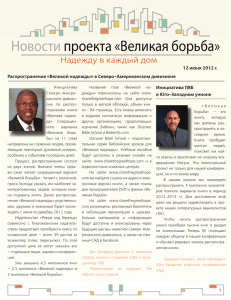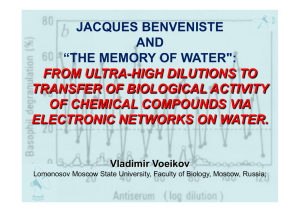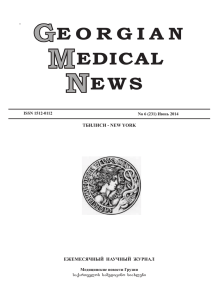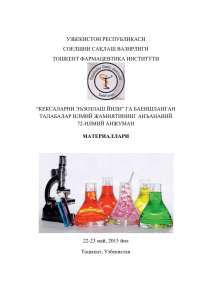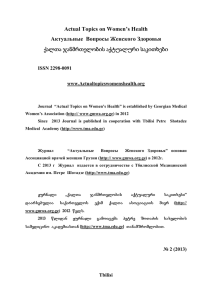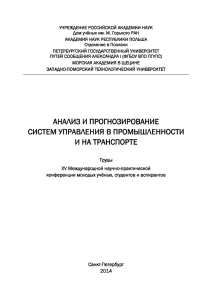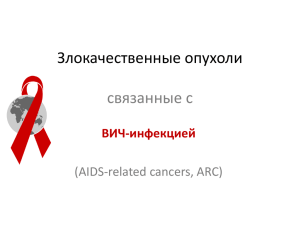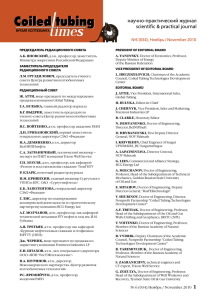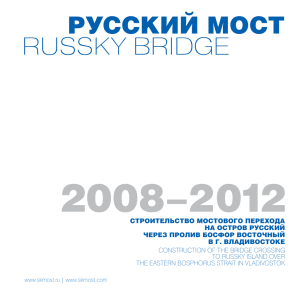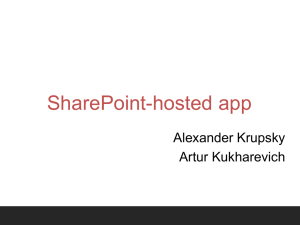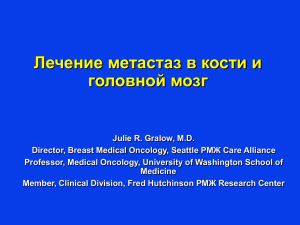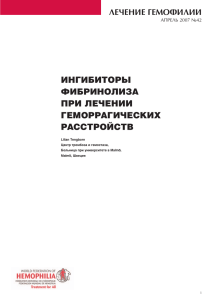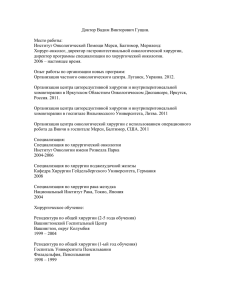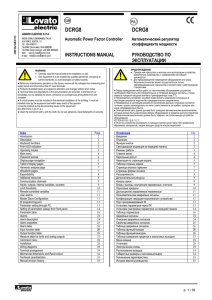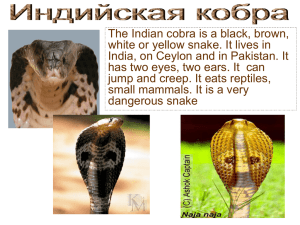Гипертермия + химиотерапия
advertisement
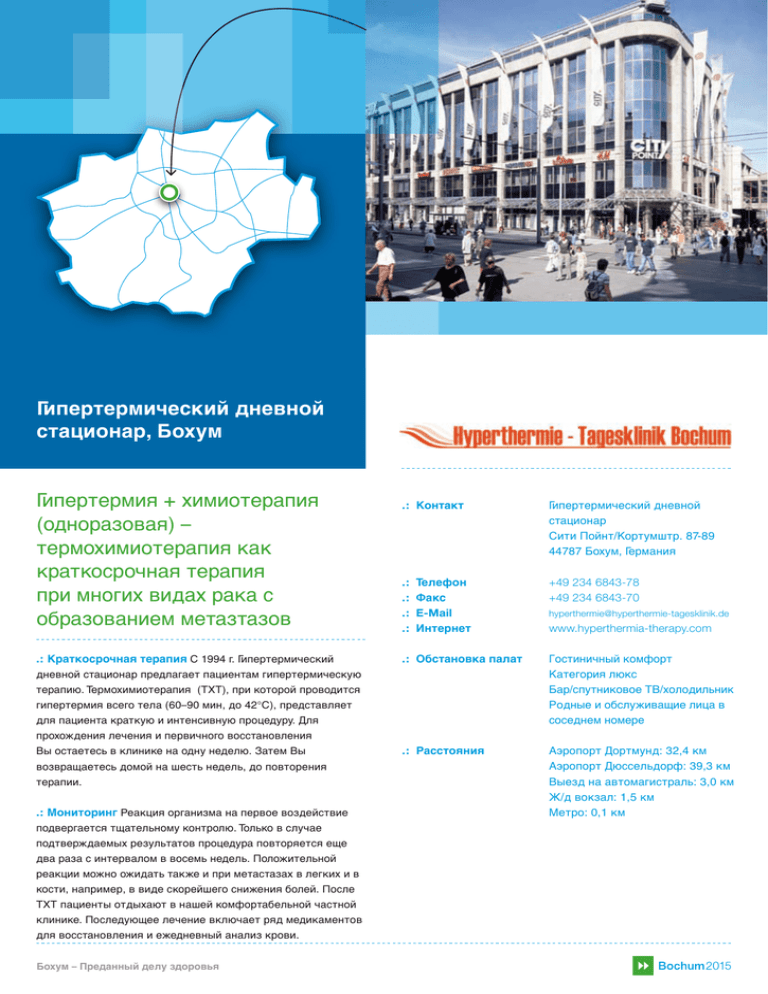
Гипертермический дневной стационар, Бохум Гипертермия + химиотерапия (одноразовая) – термохимиотерапия как краткосрочная терапия при многих видах рака с образованием метазтазов .: Краткосрочная терапия С 1994 г. Гипертермический дневной стационар предлагает пациентам гипертермическую терапию. Термохимиотерапия (ТХТ), при которой проводится гипертермия всего тела (60–90 мин, до 42°C), представляет для пациента краткую и интенсивную процедуру. Для .: Контакт Гипертермический дневной стационар Сити Пойнт/Кортумштр. 87-89 44787 Бохум, Германия .: Телефон .: Факс .: E-Mail .: Интернет .: Обстановка палат +49 234 6843-78 +49 234 6843-70 hyperthermie@hyperthermie-tagesklinik.de www.hyperthermia-therapy.com Гостиничный комфорт Категория люкс Бар/спутниковое ТВ/холодильник Родные и обслуживащие лица в соседнем номере прохождения лечения и первичного восстановления Вы остаетесь в клинике на одну неделю. Затем Вы возвращаетесь домой на шесть недель, до повторения терапии. .: Мониторинг Реакция организма на первое воздействие подвергается тщательному контролю. Только в случае подтверждаемых результатов процедура повторяется еще два раза с интервалом в восемь недель. Положительной реакции можно ожидать также и при метастазах в легких и в кости, например, в виде скорейшего снижения болей. После ТХТ пациенты отдыхают в нашей комфортабельной частной клинике. Последующее лечение включает ряд медикаментов для восстановления и ежедневный анализ крови. Бохум – Преданный делу здоровья .: Расстояния Аэропорт Дортмунд: 32,4 км Аэропорт Дюссельдорф: 39,3 км Выезд на автомагистраль: 3,0 км Ж/д вокзал: 1,5 км Метро: 0,1 км Гипертермический дневной стационар, Бохум Бохум Медицинские услуги Проф. д-р Карл Бремер руководитель отделения онкологии, отвественный за химиотерапию Д-р Арно Майер руководитель отделения гипертермии и анестезиологи, главврач .: Гипертермическая терапия Гипертермическая .: Наши специалисты В Гипертермическом дневном терапия (ТХТ) представляет собой комбинированное стационаре в Бохуме занята небольшая группа врачей- лечение хорошей переносимости для пациентов со специалистов, которые работают вместе уже 15 лет: злокачественными опухолями молочной железы, др. Арно Майер / гипертермия (главврач), проф.др. желудочно-кишечного тракта (особенно при раке Бремер / онкология, др. Райнер Ломанн / анестезия. поджелудочной железы), легких, мочеполового тракта, Наши врачи и медицинский персонал говорят на (особенно при раке яичников), кожи, костей и мягких многих языках, в т.ч. на английсокм, арабском, русском тканей, а также при некоторых злокачественных и итальянском. Сотрудникам известны различные опухолях поздней стадии в области рта и горла национальные особенности, они учитывают особые (особенно при метастазах в лимфатических узлах). В пожелания пациентов касательно питания, а также пола принципе, можно также подвергать данной терапии обслуживающего персонала. Гипертермический дневной аденокарциномы, плоскоклеточный рак с образованием стационар в г.Бохуме сердечно заботится о своих метастазов и без их образования, остеосаркомы, пациентах и вовлекает их в каждое принятие решения. саркомы мягких тканей практически в любом месте тела, злокачественные меланомы, неходжкинские лимфомы и злокачественные мезотелиомы, лейкемию. ТХТ – это эффективная альтернатива, когда традиционные методы лечения уже не действуют, либо Услуги и оборудование клиники: служба доставки из аэропорта одноместные/двухместные палаты их действие недостаточно. Гипертермический дневной размещение родственников стационар в Бохуме проводит первичную терапию смежная дверь ТХТ не поддающегося оперативному лечению рака поджелудочной железы и рака неизвестной первичной локализации. При положительной реакции организма на терапию можно ожидать значительного увеличения вероятной продолжительности жизни, а также улучшения или сохранения качества жизни. Бохум – Преданный делу здоровья гостиничный комфорт автомобильная стоянка Information for patients With this info-sheet, we would like to outline our Integrate Cancer CombinationTherapy. This is a gentle and special way to treat cancer. The Integrate Cancer Therapy is a combination of well-known ways of treating cancer under the conditions of whole body heating. Mostly performed in form of thermo-chemotherapy the therapy combines on a scientific basis the natural elements of oxygen, glucose and infrared-A heat with exemplary results for advanced cancer cases. What is thermo-chemotherapy ? The thermo-chemotherapy (TCHT) is a combined modality treatment with high tolerance for malignant tumours of the mammary gland, of the whole gastric intestinal tract (specially pancreatic cancer), of the lungs, of the urogenital tract (specially ovarian-cancer), of the skin, bones and soft-tissues as well as oral and neck advanced malignant tumors (specially node metastasis). In principle, adenocarcinoma and squamous epithelium carcinoma with metastasis (as well bone metastasis) or without metastasis, osteo sarcoma and soft-tissue sarcoma of nearly all localisations, the malignant melanoma and non-Hodgkin lymphoma and also pleural malignant mesothelioma can be treated. The TCHT main treatment, which lasts several hours, is followed by approximately 24 hours of intensive care treatment in the specially equipped hyperthermia-clinic. This means, the patient stays in our clinic for one day, one night and to midday of the following day, before being transferred to our more comfortable private hospital. The treatment itself is based on a controlled interaction between whole-body hyperthermia (body warming-up), induced hyperglycaemia (increasing of the blood glucose level), relative hyperoxemia (oxygen enrichment of the blood) and pre-arranged with the patient modified chemotherapy. Thanks to this multistep therapy, one has the chance to positively influence the course of the illness - even when tumours have not previously responded to radiotherapy, to cytostatics or to hormones. How does TCHT work? Cancer tissues accumulate lactic acid at an extremely increased glucose level, because cancer cells metabolise glucose to great extent into lactic acid, even in the presence of oxygen. This overacidification makes the cancer cells more sensitive to hyperthermia. On the other hand, the normal cells are stabilised energetically by glucose in the presence of oxygen. Therefore, in a temperature range between 41.9 and 42.5 °C (106.7 to 108.5 °F), the cancer cells are destroyed or at least damaged. The normal tissues of the organism, however, are not affected. The increased oxygen saturation in the blood results in a stabilisation of the cardiac functions, the circulatory system, the respiratory system and the central nervous system. Some cytostatics act better in an acid environment, so that the efficacy of chemotherapy can be increased through overacidification of the tumour. Hyperthermia itself also increases the efficacy of some cytostatics. Some side effects of chemotherapy can be alleviated by relative hyperoxemia. On the basis of this complex interaction, an individually adapted chemotherapy in combination with the hyperthermia is highly effective and, in general, well tolerated. What side effects can occur? During the first days after the TCHT main treatment, the occurrence of fever up to 39 °C (102.2 °F) measured axillary (under the arm), can be read as an expression of a strong immunostimulation and is desirable in most cases. At this time, though, exhaustion, weakness, nausea, vomiting, headaches, diarrhoea and herpes labialis (blisters on the lips) can also occur. Occasionally, thermally conditioned disturbances of the cell tissue metabolism in the different layers of the skin and the subcutis fat tissue, dependent on individual factors (e.g. vascularisation), can lead to thermal tissue injuries. Cases requiring treatment are, however, observed in less than 3 % of the therapies. In rare single cases after TCHT treatment, an increased amount of oncolytical products can lead to an overstrain of the excretory mechanism (liver, kidney). As a consequence, temporary jaundice (icterus) as well as an increase of the liver and kidney values may occur. Although the side effects of most of the cytostatics are milder than those of conventional chemotherapy, toxic effects of isolated cytostatics caused by the TCHT are observed in very few cases. Temporary functional disturbances of the peripheral nerves can, though, occur with temporary strength reductions, predominantly in the extremities. During the TCHT main treatment, a moderate anaesthesia is given. The patient is unable to drive for at least three days after the main treatment. In the following days, due to various reasons (e.g. after-effects of the chemotherapy or additional medications), reaction times can be reduced and, therefore, driving ability is considerably limited. Treatment procedure at our clinic The treatment starts with a comprehensive medical consultation as well as with a clinical examination. If the previous medical-imaging reports (for example, sonographics, X-rays, CTs, MRIs, nuclear medical graphics) from the family doctor are too old, these examinations must be brought up-to-date before arrival or in a radiological clinic in Bochum so that the extent of the tumour structures can be determined exactly before the TCHT treatment begins. On the day of main treatment, patients come at 8:00 to the hyperthermia-clinic with an empty stomach (on the day prior to the treatment, eating is permitted until 8:00 p.m. and drinking until midnight), a premedication (a sedative injection) is given in the morning before plus the attachment of an indwelling bladder catheter. The patient then lies naturally down - without being belted - on the net-bed of the IRATHERM 2000 infrared-A machine, free and reachable from every side, not locked in anything. The following measures are taken in order to intensively monitor all the body functions. Two peripheral venous accesses in the form of flexible soft-tip catheters are attached for infusions, intravenous injections and blood sampling. The painless localisation of the thermometric probes (rectal, axillary, as well as on the skin of the stomach and the back), of the pulse oxymeter (on the right middle finger) and of the ECG miniature adhesive electrodes complete the intensive medical monitoring. During the whole treatment time, the ECG and oxygen saturation are very closely observed and all the relevant parameters are monitored by means of blood samples every 15 minutes. Continuous blood pressure measurements as well as regular blood-gas analysis are monitored. In this way possible deviations are recognised and corrected early. Serious disturbances can thus be averted to the greatest possible extent. During an approximately 60-minute controlled infusion period, still at normal bodytemperature, the blood glucose level is increased by the three to four-fold of the initial value (by continuing the infusion during the TCHT main treatment, the blood glucose level attains a five to six-fold level of the initial value). Then, the body-warming-up process (hyperthermia) begins at approximately the same time as a moderate anaesthesia (neuroleptic analgesia at maintained spontaneous respiration; intratrachial intubation only if neccessary) which acts over a time frame of approximately 6 hours. By means of infrared-A (short-wave part of the infrared spectrum) the body-core temperature is raised to 42.0°C (107.6 °F) within about 90 to 120 minutes. The chemotherapy is administered during the warming-up phase just before the body reaches 42.0°C (107.6 °F) In the following so-called temperature-plateau-phase, a main body temperature of 42.0°C to 42.5°C (107.6°F to 108.5°F) is constantly maintained over 60 to 90 minutes. The cooling-off phase lasts for approximately another 90 to 120 minutes and uses the same monitoring measures as the warming-up and the plateau phase. An anti-emetic (a means to reduce vomiting) is added to the infusion during the last phase. During the TCHT main treatment, lasting altogether approx. 8 hours, two doctors and two nurses are constantly at the patient's side(one doctor and a nurse continiously during the night and the next morning) then the patient will be transferred to the adjoining intensive care unit, an intensive care phase follows. The next morning at about midday the patient will be transferred by an accompanying doctor to the convenient private hospital to recover. For about 5 days the patients need infusions and medicines for recovery and initial daily blood sampling. After a comprehensive concluding review, the patient can begin his or her trip home. In a detailed report which you will take along, we recommend the follow-up checks as an outpatient later at the home town. What you should also know and consider In case you have not yet been at our clinics and intend to be treated by us, please send us copies of all available reports of operation, histologies, X-rays, CTs, MRIs (magnetic resonance imaging), sonography (ultrasound) results, epicrises, physicians' letters (respectively on-going, intermediate or therapy reports). Please also provide an e-mail address, a telephone and fax number, where we can reach you. Immediately after our team of physicians has reviewed your case file, we will contact you. We will then arrange an introductory meeting with you which, as a rule, is the beginning of your treatment at our clinic. At the end of the treatment, you will receive your therapy data in a summarised treatment report, which will be made available to your family doctor. We will do our best to arrange suitable accommodation in our private hospital with hotelcomfort. Before the main treatment time, an accompanying person is of great benefit to the patient. For the time after the TCHT main treatment, an accompanying person is imperative. The therapy costs depend on the individually tailored therapy, whereby we require payment in advance of the expected therapy costs (cash or by bank account) for each treatment. The response to the TCHT will be carefully monitored after the first treatment (re-staging 6 weeks afterwards at home town) and only continued with proven results. This means two repetitions in intervals of 8 weeks in case of success.
